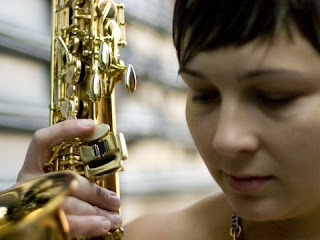There has long been this deep divide in jazz. One one side are the traditionalists, who believe in the purity of jazz as an art form that shouldn’t be diluted by combining it with other forms of music, nor should stray far from the tenets of jazz established long ago by the older pioneers like Louis Armstrong, Duke Ellington, or Charlie Parker. Noted jazz critic Stanley Crouch is one of the best-known proponents of this school of thought. And then there’s the other side of the debate that celebrates jazz as a dynamic, constantly-evolving art form. Myself, I see the merits of both sides: jazz needs to keep expanding its boundaries to keep it vital and maintain its renown as the “sound of surprise.” On the other hand, I believe it’s important to understand and celebrate its rich history, and it’s essential to know where jazz has been before there can be any serious thought about where it is headed.
This precisely is why you’ll alternately see me expound on artists old and new who delve on one side of that great divide or the other: both has something interesting and fascinating to say. Which brings me to the subject of Sharel Cassity.
Ms. Cassity’s conception of jazz leans toward the traditional side of the ledger, but in her homage to the greats from several generations ago, she, like Scotty Barnhart did just last month, reminds me of what was so exhilarating about “old school” jazz to begin with.
Unlike Mr. Barnhart, however, this virtuosic alto sax player is probably yet another generation younger than he is. Coming out of Oklahoma City, OK, Sharel Cassity’s dedication and prowess in this great American art form has garnered her a full scholarship to the Julliard School of Music (from whence she earned a master’s degree), numerous awards, and accolades from esteemed jazz musicians and critics alike.
Cassity’s tone is super-clean, with a nice lilting notes that are done in perfect measure. She plays an alto sax in the bop style, so that inevitably conjures up comparisons to the great Charlie Parker, but it’s crisp and happy in a Sonny Stitt kind of way. The phrasing is quite sophisticated: she will use trills, fast arpeggios, and other method of deliveries that are in the moment, rote-less and and rhythmically sensitive. Her note selection shows good range, but more importantly, she’s searching for the right notes, not necessarily the most difficult ones. None of this is to say that she can’t cook like Bird; she shows the facility to do that, but only pulls out the heavy arsenal when the time is right for it.
Right about a year ago, Cassity made her debut as a leader with Just For You. For this project, she enlisted the help of musicians with whom she’s worked with over the prior two years, wisely avoiding any doubts about creating chemistry. By employing a mixture of a veteran rhythm section (Vincent Ector, drums; Paul Beaudry, bass) and “young lions” (Michael Dease, trombone; Tom Barber, trumpet; Adam Birdbaum, piano), Cassel’s record starts with a seasoned foundation places a layer of young, smart and vivacious players who are poised to become the among the next leaders in the NYC jazz scene. Cassity not only mixed up the experience level of her backing band, she also chose songs that cut across a range of styles and tempos within the realm of mainstream jazz.
The album is bookended by the hot, finger snapping Dease original “Phibe’s Revenge” and a showstopping take on the ultimate bebop measuring stick “Cherokee.” On both tracks, Cassity’s blowing is inspired but controlled; recalling many of the old masters like Bird and McLean but avoiding copying and pasting phrases from them. In between are the elegant congenial “Just For You,” also by Dease, and a great showcase for Cassity’s sweet—but not overly so—tone.
Barber contributes a composition, too, the soulful and delicately conceived “Irazu (Wish You Were here).” Birnbaum supplies a dulcet, gently flowing piano solo that is the highlight of this tune.
For Lee Konitz’ brilliant composition “Wow,” all horn players replicate the amazing unison line, but manages to one-up that by performing a phrase that is played by Cassity and Dease—not together, but sequentially switching between the two in mid-sentence!. Barber did a bang-up job arranging this song. Cassity’s phrasing on her own strongly suggests the honeyed, cool style of Lee Konitz (who was the alto player on the original version), but with a innate rhythmic sense that isn’t something that she could have just learned from a classroom at Julliard.
“Lover Man” is the third standard tackled on this record, a straightforward rendition that showcases Cassity’s abilities to carry a ballad.
Michael Dease, by the way, plays a pivotal role on this record. He supplied 3 of the four originals performed on Just For You, and supplied the spirited arrangement for “Cherokee.” And Dease is a heckuva trombone player: technically proficient, reverential to tradition and yet, fresh-sounding, Dease is almost like the trombone version of Cassity and a perfect compliment for her (pick up his 2007 release Clarity here).
So what should Sharel Cassity do for an encore the next time out? As winner of the 2007 ASCAP Young Jazz Composer Award and another prize for a composition she wrote, by Downbeat Music Awards, she might do well to present her own songs on her records. No complaints here about the Dease and Barber originals and standards she chose for Just For You, but one strongly suspects that there’s another whole facet of her talents she hadn’t revealed on record yet. Cassity certainly showed us plenty enough of her performing talents on her debut disc, however.
Visit Sharel’s web site here.



